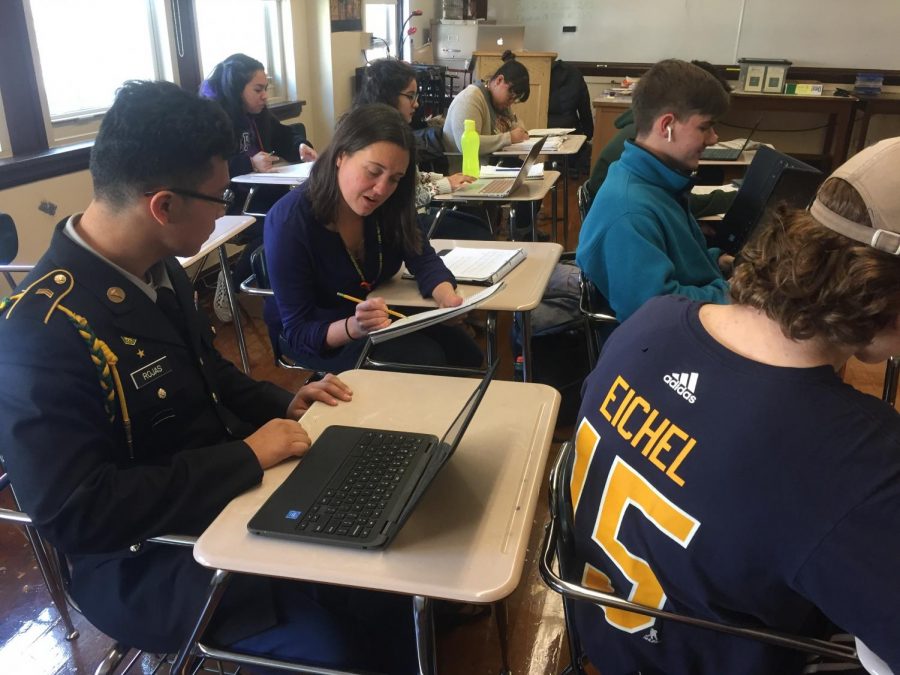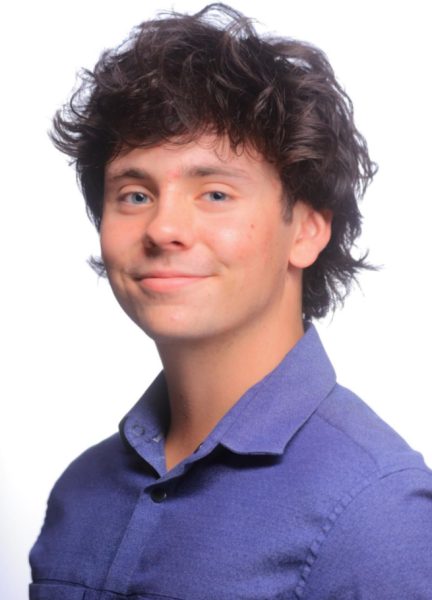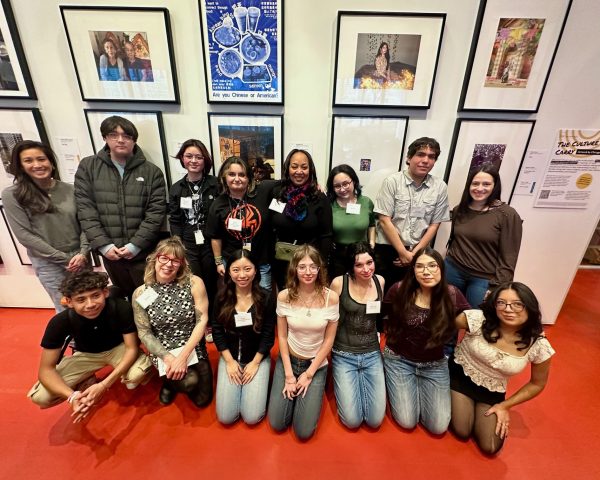Omega Humanities Program: Three years strong
Ms. Applequist helps Omega sophomore, Fidel Rojas, prepare his thesis statement for his DBQ.
Most Lane students remember running home, grabbing the letter out of the mailbox and ripping apart the envelope to be greeted by one word: “Congratulations!”
When Lauren Slaber, Div. 074, received her acceptance letter to Lane, she noticed the letter was accompanied by an invitation to join the Omega Istoria Humanities Program.
“I was ecstatic to be accepted into a program where I would be learning with people who love the same things I do,” Slaber said.
The Omega Istoria Humanities Program was created as one of Lane’s concentrations in 2016 by English teacher Brian Telles.
Omega focuses on art, theater, literature, history and music. These concentrations correlate with the social science and English courses that Omega students take.
The official Omega website stresses that this program is for students who are highly interested in the humanities and prepared to take classes at a higher level so they can be engaged in learning about what they find interesting.
It was anticipated by students and AP teachers, such as Ms. Applequist, that Omega students would be able to get a better score on an AP English or social science test because they focus on writing and reading.
Ms. Applequist, an AP World History teacher who teaches core, Alpha, and Omega students, has not seen any significant differences.
“The AP scores last year changed but not by much, but I think that will be very true for their AP United States History classes when they get to be juniors,” Applequist said.
“The administration made a great choice in adding the Omega track,” Applequist said. “The main benefit is that the students know each other, and the teachers know each other, so we can compare notes on students and see what they’re struggling with or what’s going on with them socially or outside of school.”
Slaber is still confident with her decision to join Omega when she was a freshman.
“I love being surrounded by the people that like to learn and work as hard as I do. It’s nice that we are all passionate about the same things, so it’s easy to build a community,” Slaber said.
Omega students and Alpha students are often compared to one another because the curriculums are vastly different.
Omega is a smaller, newer concentration, while Alpha is considerably larger and was added in the mid-1980s by former teachers Russell Hencinksi and Andre Dixon. Alpha focuses on science, technology, engineering and math, whereas Omega focuses on the humanities.
Jennifer Vong, Div. 072, said she joined Alpha because she felt she would do better in a science-based curriculum.
“I have always found math and science easier to understand and remember compared to reading and history,” Vong said.
According to Vong, what separates Omega students from Alpha students the most is the career interests.
“Alpha students mainly want to be doctors in the future or do something in medicine,” Vong said. “While in Omega, they want to be teachers or lawyers and not so much something that involves science or math in any way.”
Vong believes Alpha can be more stressful than Omega, and science fair is an example why.
“There are a lot of due dates that we have to complete our work by which is very stressful,” Vong said. “You have to know how to keep track of time very well. I think there are higher expectations for Alpha students because we have so many due dates and time limits compared to the coursework that Omega students have to do.”
Applequist has noticed a difference in her classes since the introduction of Omega and that there is an obvious difference between Omega students and other students.
“What separates Omega students from other students is their love of the humanities, history and English,” Applequist said. “They are passionate and open about it. They have an interest, and they bring in more outside knowledge.”
Your donations directly fund the Lane Tech student journalism program—covering essential costs like website hosting and technology not supported by our school or district. Your generosity empowers our student reporters to investigate, write, and publish impactful stories that matter to our school community.
This website is more than a publishing platform—it's an archive, a research tool, and a source of truth. Every dollar helps us preserve and grow this resource so future students can learn from and build on the work being done today.
Thank you for supporting the next generation of journalists at Lane Tech College Prep!
Maryann Ress is a senior at Lane Tech. This is her second year taking journalism and is now news editor of The Warrior. She is a member of the National...




